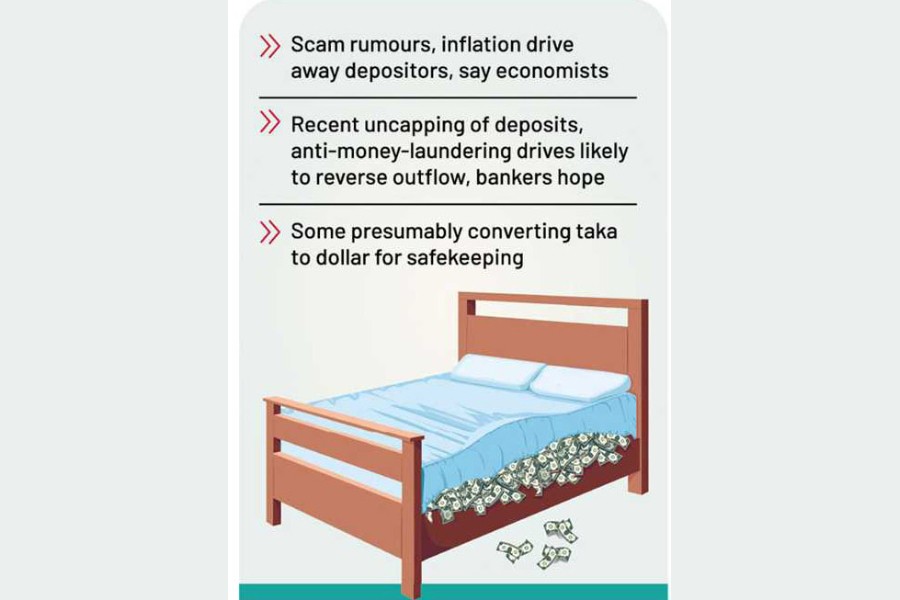A big chunk of money has been tucked under mattresses or hoarded in private strongroom recently as many believe scam 'rumours', besides bites of inflation, are driving away depositors from the banking system.
In economic jargons, currency outside the banking system is defined as legal tender in the hands of members of the public, which has ballooned in volume in Bangladesh in recent months, as figured out from the currencies in circulation.
The volume is reported to have more than doubled in percentage to 27.27 per cent, amounting to nearly Tk 2.7 trillion till the end of last December.
Usually, it remains within a growth bracket of 12 to 13 per cent, as can be seen in June 2022 over its corresponding period a year earlier. It is found 12.85 per cent between June 2021 and June 2022.
Senior bankers and experts appeared concerned over such high growth of money outside the banking system as it impacts deposit growth and subsequently lending from the banking system with their domino effect on the economy at large.
The deposit growth had been on a slide, dropping to 5.88 per cent in December over the corresponding period, the central bank data show. Deposit consists of both time deposit and demand deposit. The deposit- growth rate was nearly 9.0 per cent during June 2021-June 2022 period.
On the other hand, credits to the private sector fell to 12.4 per cent in December last over its corresponding period a year before. In June 2022, the credit growth was 14.1 per cent.
There are different views about the problem, ranging from the hoarding of currencies as 'mattress money'. Many have withdrawn on grounds of scams in shariah-based banks and higher inflationary pressures on the economy that render returns on most deposits negative in proportion to the inflation rate touching double-digit figures.
However, official sources wouldn't agree with the contentions about the flight of the local currency for use in informal markets abroad. They say the BDT is not convertible under capital account.
But they did not contest the view about some amount of money lying outside the banking system, being used to buy particularly the cash US dollar from the informal market during the period, to avoid alleged hassle from taxmen as well as the anti-money-laundering act.
"Many hold dollar as it is the most stable currency," said one official.
The overall situation is expected to change gradually as the banks, particularly private commercial banks (PCBs), are now collecting deposits offering higher interest rates after the announcement of the monetary policy statement wherewith the 6.0-percent cap on deposit has been withdrawn.
As part of the moves, some PCBs have already increased the interest rates on deposits to meet their growing demand for funds while other banks are set to follow suit from next month, according to insides in banking circles.
Many economists, as also foreign development financiers, go on whining that interest capping -- a regulatory measure meant for managing crisis-time finances -- distorted operations of the money market. Liquidity crunch is seen as one major aftereffect.
"The overall situation on deposits may improve gradually as the central bank has taken different measures, including the withdrawal of cap on deposit," said the finance official.
He also hopes the IMF loan also would give some sort of relief for many.
Talking to The Financial Express, Dr Ahsan H. Mansur, executive director of the Policy Research Institute of Bangladesh, said the higher inflation and rumours are the main reasons.
"To my mind, some money will come back gradually which had gone outside on rumours."
But, he quipped, the money outside the bank because of inflation wouldn't come back, as price rises have gobbled it up.
"Depositors, particularly small ones, have lost interest in making a further deposit with the banks mainly due to lower interest rates. But they will now get higher interest from poor-performing banks," says Dr Mansur, who had once worked with the IMF.
Chairman and Founder of Policy Exchange Bangladesh M Masrur Reaz said the increase in money circulation outside bank deposits could be attributed to the panic withdrawal by some depositors due to disclosure of several recent banking irregularities.
"The drop in bank deposit growth also reflects higher cost of living, forcing the middle class to make greater use of their savings and higher level of spending out of their income," said the economist.
Economists also focus on another downside of the money accumulated in private coffers -- splurge on consumption and resultant spur to inflation.
"The higher growth rate of currency outside the banking system may push up the inflationary pressure on the economy," says Mustafa K Mujeri, executive director of the Institute for Inclusive Finance and Development.
Mr. Mujeri, also former chief economist of the Bangladesh Bank, suggests that the policymakers take effective measures to decrease 'incentives' for holding cash.


